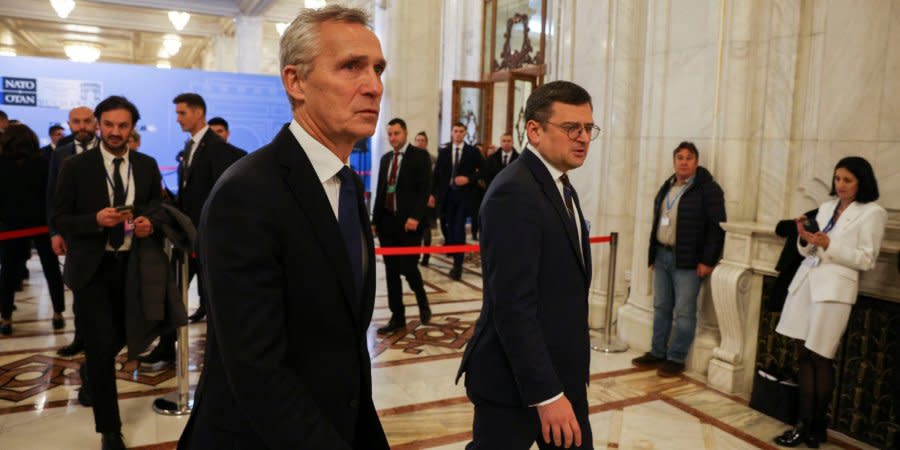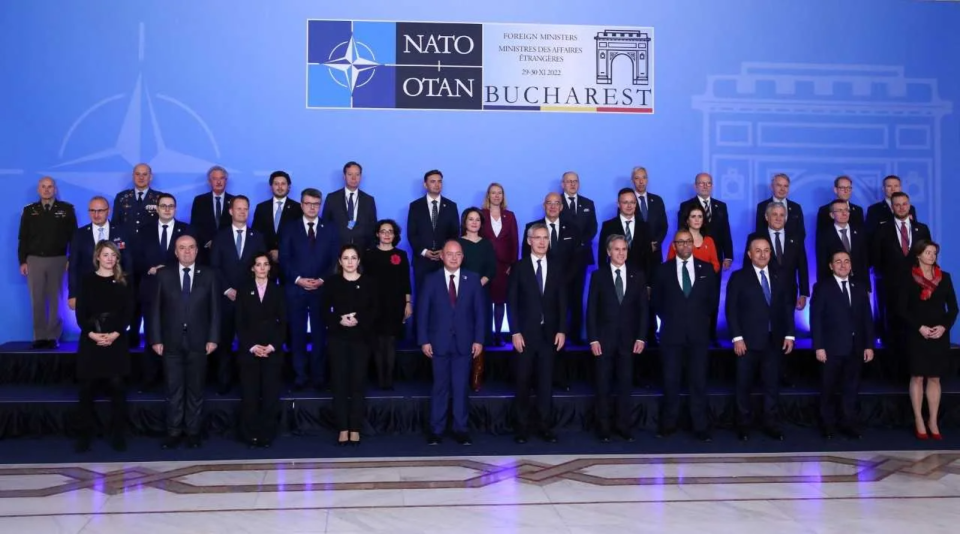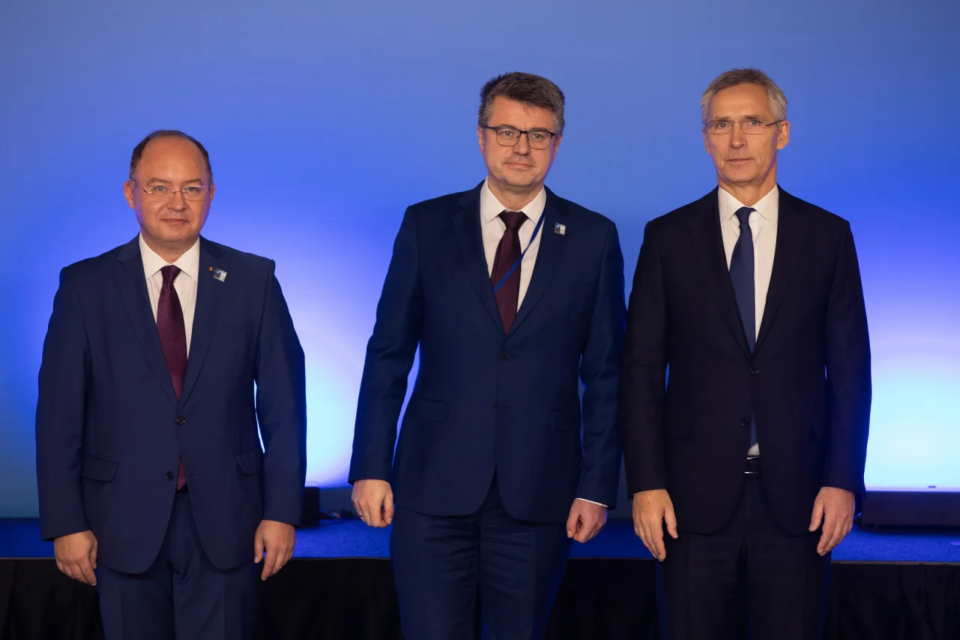What was discussed at NATO’s summit in Bucharest, and what wasn’t — NV report

- Oops!Something went wrong.Please try again later.
- Oops!Something went wrong.Please try again later.
- Oops!Something went wrong.Please try again later.
Read also: NATO secretary general calls for increased support for Ukraine
The first cars of NATO foreign ministers began to arrive at the Romanian parliament building around noon on Nov. 29. Dozens of foreign journalists gathered in its lobby to catch the opening speech of the NATO Secretary General Jens Stoltenberg, who was to announce the agenda of the ministerial meeting.
“Leave your cameras and microphones on the floor and take a step back,” the organizers warned before letting the press in to see the Secretary General.
The journalists obediently left their equipment and waited while a burly security guard with a dog examined all the equipment.
“You can go in,” he said in a few minutes, giving the "green light".
The hall was immediately filled with cameras and correspondents. In a moment, Stoltenberg approached the podium. He began his speech by stating that Russian President Vladimir Putin is now being defeated in his war with Ukraine. Therefore, with even greater cruelty he is hitting the gas infrastructure, power lines, and trying to deprive Ukrainians of water, electricity, light and heating.
Read also: NATO commits to expanding partnership with Ukraine
"We must stand by Ukraine, because President Putin is trying to use winter as a weapon of war," the Secretary General said.
"NATO allies are providing unprecedented support to Ukraine, and they will continue to do so, including by helping to rebuild gas and energy infrastructure, and by continuing to provide air defense systems.”
Stoltenberg did not specify what kind of assistance the partners would be able to provide Ukraine, or in what timeframe – it was these details that the Secretary General was to discuss over two days of meetings with the foreign ministers of the alliance and Ukrainian Foreign Minister Dmytro Kuleba, behind closed doors.
"Will (Ukraine) get more weapons after this meeting? That is in the hands of each member state," a NATO official told NV on condition of anonymity.
"But it was definitely useful, there was an atmosphere of understanding between the countries that they should do more for Ukraine.”
Strengthening assistance
How strong the support for Ukraine is today was eloquently demonstrated by the questions of foreign journalists. They frequently asked the Secretary General why the assistance to Ukraine is so slow and on such a small scale, and whether he thinks that the country has already warranted NATO membership.
In particular, when asked about the slowness of the funds for the restoration of the energy system, Stoltenberg said that such assistance has already been delivered to Ukraine by NATO member states. But this meeting was organized to drum up further support.
Read also: NATO chief urges alliance states to ramp up weapons production to continue support for Ukraine
"It provides us with a platform to mobilize further support and even greater activation, and for Minister Kuleba to meet with all his colleagues in NATO and (talk about) these urgent needs," the Secretary General said.
Ukrainian journalists asked Stoltenberg for a more specific answer about future assistance, especially if more air defenses and weapon could be expected.
The Secretary General replied that it was painful to see the destruction caused by Russian missile strikes against Ukrainians, Ukrainian cities and critical infrastructure. But that is why, according to him, the NATO allies stepped up their efforts at the meeting in Bucharest. They are discussing how to help Ukraine rebuild its destroyed critical infrastructure and protect it with air defenses.
"Part of this is about providing more air defense systems, but also ensuring that the systems we have already provided are operational," said Stoltenberg.
"Many of them are actually modern, standard NATO air defense systems, including NASAMS and others. This means that we have to provide spare parts and ammunition. So it's not just about providing more weapons, but also making sure that the weapons that are already provided by NATO allies can be used to shoot down incoming Russian missiles and drones."

Another key issue — besides the restoration of energy and the provision of air defense — was the future membership of Ukraine in NATO. After all, it was in Bucharest 14 years ago that Ukraine and Georgia were given hope that they would become members of the alliance, only to be denied a Membership Action Plan. Russia has since attacked both Georgia and Ukraine.
Asking about this, the journalist from U.S. newspaper the New York Times noted that Stoltenberg and other leaders of Western countries constantly stress that Ukraine is fighting and defending "our values, defending our democracy, and also defending our borders."
"Doesn't Ukraine deserve NATO membership? Doesn't it deserve something more than some vague promises that sometimes just stretch over the horizon?" the journalist asked.
Stoltenberg's answer to this question, as well as to others like it, was similar: first Ukraine needs to win the war.
The Secretary General argued that the most immediate task is for Ukraine to win as a democratic nation of Europe. And in order to make this possible, the allies should mobilize as much forces, means, humanitarian and other types of support for Ukraine as possible.
"If Ukraine fails to win as a sovereign independent and democratic state, then the question of membership disappears," Stoltenberg said.
NV asked the Secretary General what, in his opinion, can ensure lasting peace in Ukraine until it becomes a NATO member. In response, the head of the alliance said that the way to achieve peace is to provide military support to Ukraine.
"It may sound like a paradox, but the reality is that the best way to achieve a lasting and sustainable peace is to provide military assistance to Ukraine,” NATO chief said.
“Then Russia will learn, and President Putin will understand, that he cannot achieve his goals on the battlefield, that he must sit down at the negotiating table and negotiate in good faith, and make serious concessions for a lasting peace.”
Energy, air defense and weapons
Already in the afternoon of Nov. 30, the main meetings of NATO foreign ministers were coming to an end. After them, Kuleba said that the country was promised deliveries of generators and transformers to restore the power system as soon as possible.
The issue of weapons was not ignored. "We’re talking about providing artillery (systems), armored vehicles and new (artillery) rounds,” the minister said.
Read also: NATO uses all available tools to step up military aid for Ukraine, says Ukrainian MP
“These are the biggest things that were announced — and we are not counting such smaller things as cartridges, grenades and everything else."
However, Kuleba did not say what types of weapons are in question and which countries have pledged them. Also, according to him, the partners have not yet made a decision on the supply of NATO Patriot air defense systems to Ukraine.
Kuleba noted that there is no taboo on the supply of air defense systems. Problems arise only because these systems cannot be bought, so to speak, in a supermarket.
"They are all pre-assigned, they all have a purpose, most of them are already protecting parts of the airspace of certain countries," Kuleba said.
"So if we are talking about getting some systems like (old U.S.) Hawk air defense systems, re-equipping and modernizing them a little bit, it takes time. There is a desire and readiness to do this, but it takes time. At the same time, no one can remove an air defense system from combat duty."
Despite this, Kuleba noted that all countries have demonstrated their willingness to obtain the fastest possible result.
Read also:
US, South Korea and France to send almost 200 generators to Ukraine
US to provide Ukraine with $53 million in power grid equipment
EU to transfer 40 more generators to Ukraine to support energy system
Support until victory
Commenting on the two-day NATO meetings in an exclusive comment to NV, Estonian Foreign Minister Urmas Reinsalu said that they had a certain political framework: more needs to be done for Ukraine. He said that at the meetings he called on those countries that have the appropriate capabilities to supply Ukraine with tanks, air defense and long-range weapons, "so that Ukraine can reach the places from where missiles are launched."

According to him, some countries stated during the meeting that they would supply Ukraine with new air defense systems. However, Reinsalu does not know for sure whether NATO countries will ever agree to provide Ukraine with long-range weapons. He is convinced that this is a certain tragedy of this war — the fact that Western countries increase their assistance only after yet another round of atrocities on the part of Russia.
"We remember well how in the spring, when Ukraine was left without artillery, some countries hesitated to provide it to you because they were afraid of further escalation," the minister said.
“Now I constantly say that we must supply the entire range of weapons that we have, without any reservations about their use."
Read also: NATO to back Ukraine as long as necessary, says Stoltenberg
At the same time, U.S. Secretary of State Antony Blinken, who also arrived at the ministerial meeting in Bucharest, assured that his country, together with NATO allies and G7 partners, intends to further increase the volume of assistance to Ukraine in order to deprive Putin of the opportunity to hold the rest of the world hostage.
According to him, the allies have already provided Ukraine with $40 billion worth of weapons, and more is on the way. In addition, he welcomed the efforts of the European Union, which is preparing the 9th package of sanctions to reduce the Kremlin's ability to wage a brutal war.
"The overarching message from our meeting in Bucharest is this: our collective resolve to support Ukraine is unwavering and will remain so now, this winter, and for as long as it takes for Ukraine to succeed," Blinken said.
Read the original article on The New Voice of Ukraine

